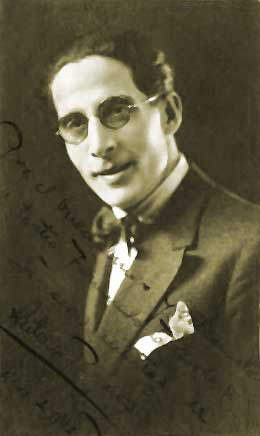The son of well-known actress Juana Espejo, he occasionally appeared on stage with his mother from six years old, and made his "adult" debut at
18 years old in straight theater, stepping in for a sick actor, again at his mother's side, at the Teatro Romea in Madrid. He pleased, and got a
contract at that theater. In 1912, he traveled to Cuba, where he appeared at the Teatro Payret in Havana, still as a straight actor.
Next, he went to San Juan in Puerto Rico, where in 1914 he made his debut as a singer – first, unsuccessfully, as a lyrical tenor in the
zarzuelas El cabo primer (Fernández Caballero) and La revoltosa (Chapí), soon as a – highly successful –
"tenor comico". Back to Cuba, he participated in the world premiere of Después de un beso by Eduardo Sánchez de Fuentes
(1916), and the local premiere of Las golondrinas by Usandizaga (1915). For a while, he had his own troupe in Cuba. He also toured Santo
Domingo and Venezuela. From 1921, he was a member of the Teatro Martí in Havana, then of the Teatro Actualidades. He sang in the world
premieres of Diabluras y fantasia (10 March 1922) and Jacque al rey (15 April 1922).
In 1923, Palacios returned to Spain, where he took part in a considerable number of zarzuela world premieres, always in secondary roles:
Doña Francisquita (Vives), 17 October 1923, Teatro Apolo, Madrid; La calesera (Alonso), 12 December 1925, Teatro de la
Zarzuela, Madrid; El caserío (Guridi), 11 November 1926, Teatro de la Zarzuela; La villana (Vives), 1 October 1927, Teatro
de la Zarzuela; Los flamencos (Vives), 15 November 1928, Teatro Apolo; El talismán (Vives), 6 December 1932, Teatro
Calderón, Madrid; Jazz band (Penella), 15 April 1933, Teatro Novedades, Barcelona; Tana Fedorova (Penella), 3 March 1934,
Teatre Tívoli, Barcelona; La tabernera del puerto (Sorozábal), 6 April 1936, Teatre Tívoli; and many, many more...
His most famous role was Cardona in Doña Francisquita. In 1925 and 1935, he appeared in Havana again (Teatro Martí and
Teatro Principal de la Comedia, respectively).
A dedicated socialist, he sided (albeit Castilian) with the Catalans in the Spanish Civil War and was a leader of the party "Republican Left" in
Barcelona. After the victory of Franco's fascists, he fled to France, where he was interned (which was the rule for Spanish Republicans since
France was explicitly neutral in the Spanish Civil War, concerned about not being drawn into the conflict).
In 1940, Palacios emigrated to Cuba
for good, where he remained active for decades as a singer at the Havana theaters Principal de la Comedia, Martí, Payret and Campoamer,
as an actor and director of radio plays, leader of the radio choir and university lector. After Che Guevara's and Fidel Castro's 1959 revolution,
his career took even more steam, and he founded a touring zarzuela company (Teatro Lírico Nacional) and became a prominent figure on
Cuban TV, as a presenter, producer, artistic director and screenwriter. He was also a stage director in zarzuela productions in Havana. He
kept working up to his death.
Reference 1, reference 2
Source for the recording: Youtube channel "zarzuelaoro"
